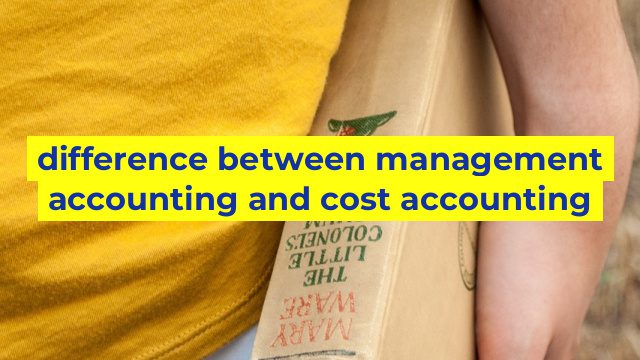The Difference Between Management Accounting and Cost Accounting
Managing a business requires making informed decisions, which are only possible with accurate financial information. Two key areas of accounting that play a critical role in providing this information are management accounting and cost accounting. Although there is some overlap between the two, there are significant differences that business owners and managers should know.
Management Accounting
Management accounting provides financial information to help business owners, managers and executives make informed decisions that are based on current and future performance, rather than past performance. Management accounting is forward-looking and is designed to provide information on profitability, cash flow, and financial stability, among other things. It is a tool that helps businesses make strategic decisions by forecasting future trends and identifying weak areas that need improvement.
Management accounting is used by internal stakeholders, including business owners, management, and executives. It focuses on long-term planning and strategic decision-making rather than short-term goals. Management accounting is used to identify future growth opportunities, manage risks, and optimize business performance.
Cost Accounting
Cost accounting is focused on analyzing and collecting information about the costs associated with producing a product or providing a service. It is used to track and understand the amount of money a business spends on a particular activity or product. Cost accounting is crucial in determining the profitability of each product and helps to determine pricing strategies. This type of accounting provides businesses with accurate information about the cost of goods sold, inventory valuation, and product pricing.
Cost accounting is primarily used by internal stakeholders, including business owners and managers, to make decisions based on financial data at hand. It is an essential tool for tracking costs and evaluating the performance of a business. Cost accounting is used to minimize costs and maximize profits by identifying opportunities for cost savings and leveraging that data to make informed decisions.
The Differences Between Management Accounting and Cost Accounting
While management accounting and cost accounting share similarities, they have fundamental differences in terms of scope and focus. Management accounting is focused on future planning and strategic decision-making, while cost accounting is focused on analyzing the actual costs of production and the profitability of a business. Management accounting is used by internal stakeholders involved in long-term planning and decision-making, while cost accounting is used by both internal and external stakeholders, including creditors and suppliers.
In summary, management accounting and cost accounting are two critical areas of accounting that are essential for business decision-making. Business owners and managers who understand the differences between these two accounting techniques can use the information to make informed decisions that will help them optimize business performance, reduce costs, and increase profitability.
Table difference between management accounting and cost accounting
| Management Accounting | Cost Accounting |
|---|---|
| Focuses on the internal use of financial information to make decisions that will help achieve organizational objectives | Focuses on the collection, analysis, and reporting of cost data for use in decision making and cost control |
| Looks at financial and non-financial data to evaluate and improve business performance | Primarily concerned with measuring and minimizing costs of production, selling, and distribution |
| Includes forecasting, budgeting, and performance evaluation | Involves creating cost centers and analyzing cost behaviors |
| Uses both historical and current data to make informed decisions | Relies heavily on historical costs and data to make decisions about cost control |
| Targets managers and other internal stakeholders who need information for decision making | Tends to be more focused on accountants, auditors, and financial analysts who need data for financial reporting |
